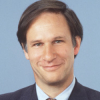Robert Krulwich

Robert Krulwich
Robert Louis Krulwich is an American radio and television journalist who currently serves as a science correspondent for NPR and is a co-host of the program Radiolab. He has worked as a full-time employee of ABC, CBS, National Public Radio, and Pacifica. He has done assignment pieces for ABC's Nightline and World News Tonight, as well as PBS's Frontline, NOVA, and NOW with Bill Moyers. TV Guide called him "the most inventive network reporter in television", and New York Magazine...
NationalityAmerican
ProfessionJournalist
CountryUnited States of America
I did television for a very long time, but if you're on television, words don't count. What the eye sees beats the words. If you switch sides, from radio to television, you learn that the wordiness that you learn on the radio is useless or not nearly as powerful, and you have to learn to trust that the eye will just beat the ear.
When you go to the theater, you are slipping out of your life into someone else's imaginary world.
What happens if you are the last (the very, very last) of your species, and you die - and humans notice? We live, increasingly, at a time when extinctions are recorded, remembered, and the last animal (or plant) in its line, by virtue of its being last, becomes a kind of celebrity. Its finality becomes a thing to honor.
I am fascinated by storytelling glue. Anytime I see someone who's good at it, I stop and wonder, 'How'd they 'do this? Why can't I tear myself away?
So many people are not aware that NPR writes things, 'posts' things. But we are spreading the word.
News, after all, is a spin of words and pictures. It's a kind of music. There are beats in a newscast, a newspaper story. Ed Murrow sounded like Ed Murrow. Huntley and Brinkley sounded different. Anderson Cooper, different still.
When I was a teenager, I loved political conventions.
Great teaching - just plain old knock 'em dead, get it right, make 'em laugh, make 'em wonder instruction - is always going to be rare. Good teachers abound. Great ones are special.
Journalism doesn't have to be your first love... or your only love. You can come to it in desperation, because you can't think of anything better to do with your life, that it's this or the abyss. But once you get going... it helps if you love it.
When you talk or write or film, you work with the music inside you, the music that formed you. Different generations have different musics in them, so whatever they do, it's going to come out differently, and it will speak in beats of their own generation.
Cezanne produced precarious little worlds that almost, almost, almost lose their balance but somehow hold themselves together, creating tension, beauty and danger all at once.
If I were king of the world, babies born in airplanes, balloons and blimps would, instead of choosing to be German, Maldivian or American, all get special heavenly blue passports with a stork on the cover labeled 'Sky Baby' - and they'd be allowed to come and go anywhere they please.
If you want to be a poet, you can just write it on a napkin, and it's the length of the napkin, I guess. But usually you decide you'll rhyme it, or you'll have a formula. In radio, that's something called, 'Close your eyes and listen.'
A seed, after all, is an embryo, a potential plant waiting for its moment to grow. It has what it needs to begin. But it can also put itself on pause. It can wait.